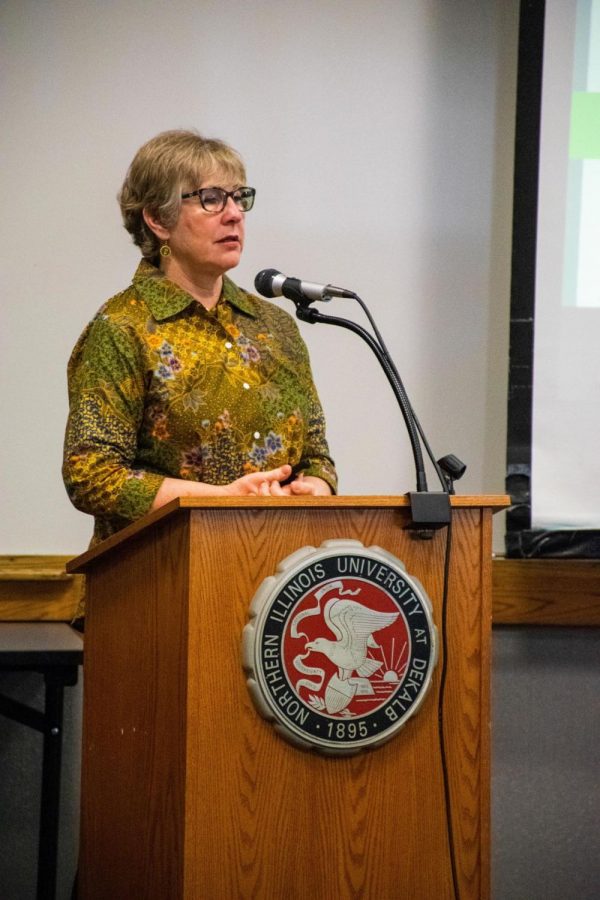Fulbright specialist back from Indonesia, shares experiences
April 24, 2019
DeKALB — Doris MacDonald, associate professor of the English Department, Teaching English to Speakers of Other Languages and Applied Linguistics, shared experiences gained abroad in Indonesia during the latest Friday lecture at the Center for Southeast Asian Studies.
At noon Friday in the Campus Life Building, MacDonald presented her lecture, in which she related her time spent as a Fulbright Specialist at the Universitas Mulawarman in Samarinda, East Kalimantan, Indonesia, from Feb. 10 to March 23. It was her third academic visit to Indonesia.
Samarinda is the most populous city in the island of Borneo, which is located in the Indonesian archipelago. It lies on the banks of the Mahakam river and has a vibrant local community, MacDonald said.
While there, she instructed graduate students and faculty on second language acquisition, taught methods and materials in teaching English and held clinics and workshops on academic writing.
MacDonald said the hospitality of her hosts was unparalleled.
“It was marvelous where I stayed because it was right next to campus and 92 degrees at all times,” MacDonald said. “I’ve never felt more welcome anywhere. I was being incredibly well taken care of, which is always the case in Indonesia.”
She said students and faculty of Universitas Mulawarman readily welcomed her, taking her on tours of the city, inviting her to weddings and feeding her at every opportunity. One of the highlights of her trip, she said, was visiting the banks of the Mahakam River. According to a local legend, anyone who drinks from the river will return.
In the classroom, every student or faculty member she interacted with was open to asking questions, sharing information and experiences and staying on task at all times, she said.
“Working was intense some days, frustrating sometimes and rewarding every day,” McDonald said. “I met so many people whose names I will not remember but wish I could. Everyone took me in hand and took me places that were just marvelous to see.”
Another focus of her lecture was the necessity of the Fulbright Specialist program itself.
The program, facilitated by the U.S. State Department, sends American scholars abroad to consult on curriculum, administrative planning and faculty development for a period of two to six weeks. McDonald said she would promote this opportunity to anyone interested.
“I’m really trying to tell people to explore,” McDonald said. “One of my big regrets was that I didn’t do anything overseas as an undergraduate. Although now I get great opportunities to do that, I think especially in an uneasy job market, some international experience could really help.”
The Center for Southeast Asian Studies hopes to bring awareness to the many opportunities for study abroad programs for NIU students, according to the center’s communications manager, Liz Denius.
She said programs are accessible through Fulbright, various associated faculty and the Center for Career Studies.
“We have so many [study abroad programs],” Denius said. “For any student who wants to be involved, if you’re interested in any [Southeast Asian country], come by the center, and we can talk to you about all these programs that are both privately and publicly funded. People wouldn’t think that a university in the middle of a cornfield would have as many relationships out in the world as NIU does.”
The Center for Southeast Asian Studies is the only resource center on campus to be funded through Title VI. The center offers courses in languages, history, anthropology and political science.
Director Eric Jones said the grants offered to the center enable more engagement and research opportunities for students and faculty.
“We’re supposed to be spreading content and training about the region nationwide,” Jones said. “We abide by the Department of Education’s philosophy that it’s good to have a large group of Americans who are educated in the language and culture of a particular region, in this case Southeast Asia.”







